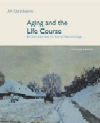1. How does the type of care family members provide to an elderly relative
differ depending on their gender?
Although men and women both feel a sense of obligation to provide care to their
aging parents, women are more likely to be the primary caregivers to the frail
el-derly and to provide the greatest amount of care. Men and women also tend
to perform different tasks. Daughters typically provide hands-on care such as
feeding, dressing, or bathing, while sons are more likely to help with household
chores, financial management, and yardwork. 2. How do the responsibilities of caregiving affect a family member's
work and personal life?
Although the majority of caregivers are not in the labor force, approximately
one-third are employed. Caregiving affects work in several ways. Even if employed
caregivers continue working full-time, caregiving responsibilities may force
them to work fewer hours, rearrange schedules, and take time off. Some caregivers
quit work or retire earlier than planned if their caregiving responsibilities
create conflicts with their ability to perform their jobs. The psychological
toll that caregiving takes on caregivers is measured in terms of stress and
burden. Surprisingly, although women employed outside the home seemingly have
a higher burden than nonemployed women, they report less stress. It may be that
satisfaction from work and contact with the outside world reduces stress, despite
greater responsibilities from dual roles. 3. How does an aged person's need for care affect family relationships?
Caregiving may strain family relationships, but it may also enhance them. A
child may be disturbed by personality changes in an aging parent or by the role
reversal that may occur when the parent becomes dependent. Siblings may quarrel
over the division of caregiving tasks. Marriages may be strained when spouses
have less time for each other because of caregiving burdens. When the burden
is shared equally, however, family members may appreciate each other and feel
that familial ties have been strengthened. 4. What kind of home and community-based services are available to
the frail elderly?
Home and community-based services help the frail elderly remain in their own
homes. Among the services most commonly provided are personal care, housekeeping,
and case management. Some communities also provide respite care for caregivers,
adult day care, medical or rehabilitative care, and hospice services. 5. Can private long-term care insurance help families to manage the
expense and burden of caregiving?
Although currently only 2.5 percent of long-term care costs in the United States
are paid by private insurance, this percentage is increasing as people learn
that the government does not pay for most services. Yet there are many problems
to be resolved before long-term care insurance fills the long-term care needs
for most Americans. One problem is that many older people cannot afford to pay
the premiums for long-term care insurance. Many let their policies lapse and
lose thousands of dollars in payments. Another problem is that private insurers
often turn down people who need insurance the most, those with major health
problems. 6. How have government regulations and the rise of for-profit nursing
home chains affected the availability and quality of nursing home care?
A growing number of nursing homes are owned by for-profit multinational chains
that operate facilities in the United States and in other countries. These chains
are businesses that are responsible to shareholders to show a profit. Research
shows that the best care is provided by nonprofit homes, especially those that
are attached to a religious group. 7. -What is life in a nursing home like for the frail elderly?
People dread the thought of moving to a nursing home, and the adjustment to
institutional life is difficult. The monotonous daily routine demanded by bureaucratic
procedures reduces the quality of life for residents and places pressure on
the aides who provide care. Residents are often denied the small pleasures that
make life worthwhile by aides who are required to maintain a dehumanizing schedule.
Patient abuse is a continuing concern in nursing homes. Although physical abuse
is rare, psychological abuse is unfortunately more common. Not so much intentional,
abuse results from the frustrations of overworked and underpaid aides. | 


 2002 McGraw-Hill Higher Education
2002 McGraw-Hill Higher Education